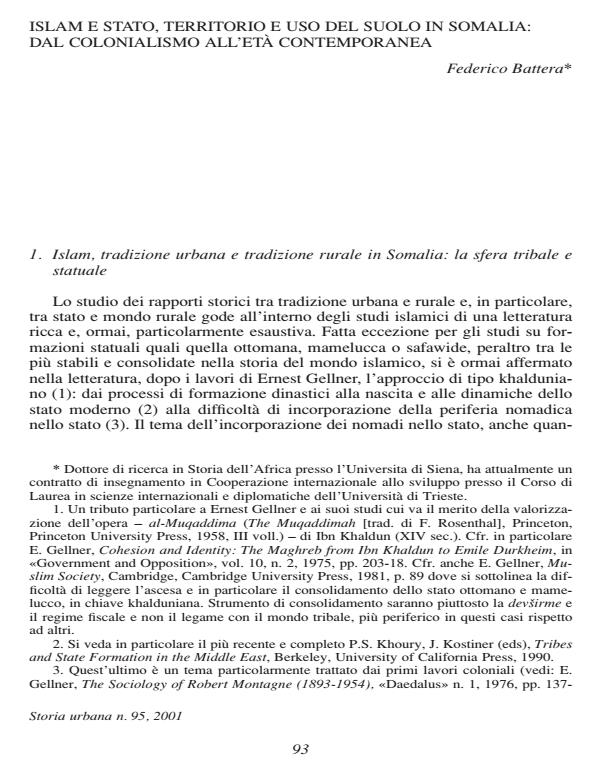Islam e stato, territorio e uso del suolo in Somalia: dal colonialismo all'età contemporanea
Titolo Rivista STORIA URBANA
Autori/Curatori Federico Battera
Anno di pubblicazione 2002 Fascicolo 2001/95
Lingua Italiano Numero pagine 25 P. Dimensione file 111 KB
DOI
Il DOI è il codice a barre della proprietà intellettuale: per saperne di più
clicca qui
Qui sotto puoi vedere in anteprima la prima pagina di questo articolo.
Se questo articolo ti interessa, lo puoi acquistare (e scaricare in formato pdf) seguendo le facili indicazioni per acquistare il download credit. Acquista Download Credits per scaricare questo Articolo in formato PDF

FrancoAngeli è membro della Publishers International Linking Association, Inc (PILA), associazione indipendente e non profit per facilitare (attraverso i servizi tecnologici implementati da CrossRef.org) l’accesso degli studiosi ai contenuti digitali nelle pubblicazioni professionali e scientifiche.
Compared to the rest of the Islamic world, the situation in Somalia has only been peripherally related to the state, while other Islamic contextshave been characterized more by state institutions. In the case of Somalia, the state never really defined a tribal reality, and the tribal world forged its identity and its institutions completely outside of the institutions of the state. The land-tenure system in Somalia originated from a flexible idea of tribal territory. The existence of tribal authorities was conceived in order to discipline land access. Through the Waqf, Islam helped to reduce the role of customary law during pre-colonial times. However, colonial and post-colonial experiences represent the dramatic transition from a society ruled by customs and traditions to a centralized state. The existence of a bureaucratic administration and the modern idea of exclusive state sovereignty over territory has helped to reduce traditional ways of regulating land access. Both the colonial and the post-colonial centralized state advanced the idea of land as a development tool. The collapse of the state (1991) has not completely reversed state policies. In the most ravaged yet rich southern regions, land access remains one of the major matters of concern, and rural communities are still forced to pay high taxes for war and factionalism.
Federico Battera, Islam e stato, territorio e uso del suolo in Somalia: dal colonialismo all'età contemporanea in "STORIA URBANA " 95/2001, pp , DOI: